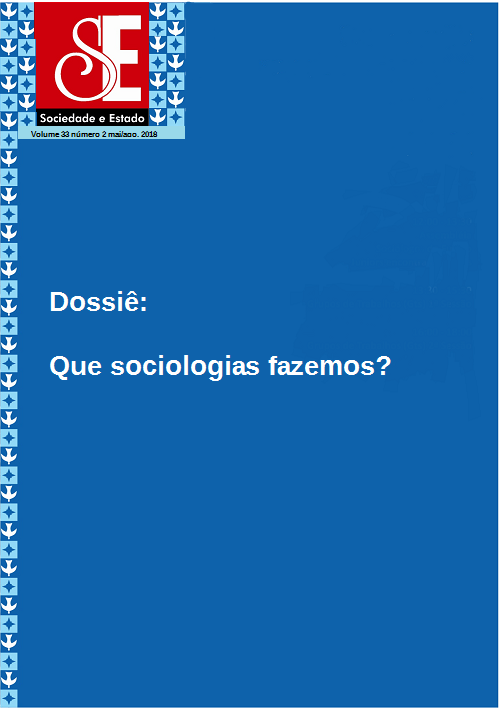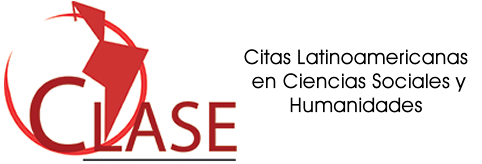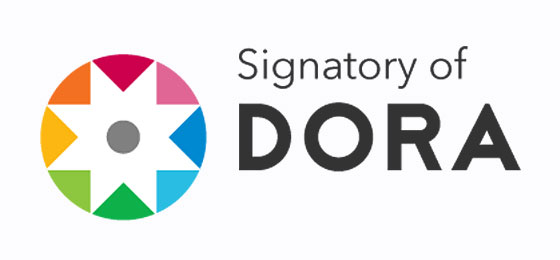The Sociology and its Interfaces with local, national and global contexts
Keywords:
National Sociologies, Globalization of sociology, Power structure in the transnational space of sociology, Diversification of the international production of sociologyAbstract
The article emphasizes that, in addition to the presence of sociology within different national societies, in the last decades the creation of a transnational space for the production of sociology took place. The emergence of this transnational space of sociology presents an asymmetric power structure, due to the unequal distribution of material and symbolic resources between countries. It underlines the importance of using a reflexive sociology, which calls for a constant reflection on the historical, social, institutional and academic conditions that are present in the production of sociological knowledge, able to elucidate the complex relationship between this new transnational space of discipline and the various national sociologies.
Downloads
References
ALATAS, Syed. The autonomus, the universal and the future of sociology. Current Sociology, v. 54, n. 1, p. 7-23, 2006.
ARJOMAND, Said. International sociology into the new millennium: the global sociological community and the challenge to the periphery. International Sociology, v. 15, n. 1, p. 5-10, 2000.
BECK, Ulrich. Cosmopolitan vision. Cambridge (UK): Polity Press, 2006.
---- . How not to be a museum piece. The Bristish Journal of Sociology, v. 56, n. 3, 2005.
BHAMBRA, Gurminder. Connected sociologies. London: Bloombury, 2014.
CALHOUN, Craig. The sociology in America: a history. Chicago (IL): The Chicago University Press, 2007.
CANTWELL. Brendan. Transnational mobility and international academic employment: gatekeeping in an academic competition arena. Minerva, v. 49, n. 4, p. 425-445, 2011.
CONNELL, Raewyn. Learning from each other: sociology on a world scale. In: PATEL, Sujata (Org.). The ISA handbook of diverse sociological traditions. London: Sage, 2010.
---- . Southern theory. The global dynamics of knowledge in social science. Sydney: Allen &Unwi, 2007.
DELANTY, Gerard. The cosmopolitan imagination: the renewal of critical social theory. Cambridge (UK): Cambridge University Press, 2009.
DEMAZIÈRE, Didier et alii. Les sociologies françaises: héritages et perspectives (1960-2010). Rennes: Presses Universitaires de Rennes, 2015.
ELLIOT, Anthony; URRY, John. Mobile lives. Oxford (UK): Routledge, 2010.
ELLIOT, Anthony; LEMERT, Charles. The new individualism: the emotional costs of globalization. London: Routledge, 2006.
GAREAU, Frederick. Another type of third dependency: the social sciences. International Sociology, v. 3, n. 2, p. 171-178, 1988.
HEILBRON, Johan. French sociology. Ithaca (NY): Cornnell University Press, 2015.
---- . The social sciences as an emerged global field. Currenv Sociology, v. 62, n. 5, p. 685-703. 2014.
HEILBRON, Johan et alii. Internationalisation des sciences sociales: les leçons d’une histoire transnationale. In: SAPIRO, Gisèle (Org.). L’espace intellectuel en Europe: de la formation des Étas-nations à la mondialisation: XIX-XX siècles. Paris: La Découverte, 2009.
HSU, Eric. Social theory and globalization. In: ELLIOT, Anthony (Org.). The Routledge companion to social theory. London: Routledge, 2010.
KEIM, Wiebke (Org.). Global knowledge production in the social sciences. London: Routledge, 2016.
---- . Counterhegemonic currents and internationalization of sociology. International Sociology, v. 26, n. 1, p. 123-145, 2011.
KNÖBL, Wolfgang. Reconfigurações da teoria social após a hegemonia ocidental. Revista de Ciências Sociais, v. 30, n. 87, p. 5-17, 2015.
LEVINE, Donald. Visions of the sociological traditions. Chicago (IL): The University of Chicago Press, 1985.
MARINGE, Felix; FOSKETT, Nick (Orgs.). Globalization and internationalization in higher education: theoretical, strategic and management perspectives. London: Continuum Iternational Publishers, 2010.
MICELI, Sergio; MARTINS, Carlos Benedito. Sociologia brasileira hoje. São Paulo: Ateliê Editorial, 2017.
PATEL, Sujata. Doing sociology in India: genealogies, locations and practices. Oxford (UK): Oxford University Press, 2011.
PLATT, Jennifer. History of the (ISA) International Sociological Association. Montréal: Université de Québec, 1998.
RAY, Larry. Globalization and evereday. London: Routledge, 2007.
ROBERTSON, Roland. Globalization: social theory and global culture. London: Sage Publication, 2000.
SZTOMPKA, Piotr. One sociology or many? In: PATEL, Sujata (Org.). The ISA handboook of diverse sociological traditions. London: Sage, 2010.
TOURAINE, Alain. Un nouveau paradigme pour comprendre le monde d’aujourd’hui. Paris: Fayard, 2004.
TURNER, Bryan. The enclave society: towards a sociology of immobility. European Journal of Social Theory, v. 10, n.2, p. 287-303, 2007.
TURNER, Bryan; KHONDKER, Habibul. Globalization: East and West. London: Sage, 2010.
UNITED NATIONS EDUCATIONAL, SCIENTIFIC AND CULTURAL ORGANIZATION (UNESCO). World social science report. Knowledge divides. Paris: Unesco, 2010.
VESSURI. Hebe. Global social science discourse: a southern perspective on the world. Current Sociology, v. 63, n. 2, p. 297-313, 2015.
VESSURI, Hebe; LOPEZ, Maria. Institutional aspects of the social sciences in Latin America. World social science report. Paris: International Science Council Unesco Publishing, 2010.
WIEVIORKA, Michel; MORET, Jacques. Les sciences humanines et sociales françaises à l’échelle de l’Europe et du monde. Paris: Éditions de la Maison des Sciences de l’Homme, 2017.




.jpg)



















